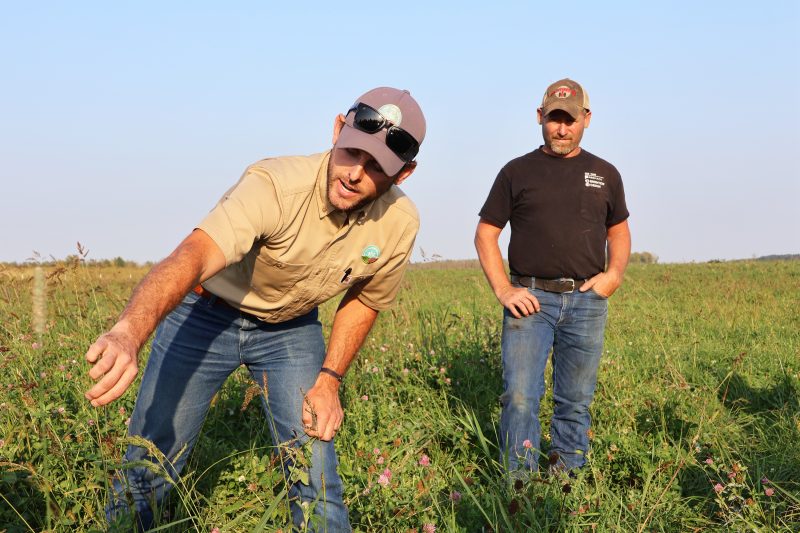Note: This is the 5th installment in the 12-part “A Sense of Where You Are” series.
Grazing livestock have been described as “combines that poop.” That’s an accurate, if somewhat graphic, depiction of how moving cattle and other animals through well-managed paddocks can rebuild soil that’s been decimated by tillage, chemical use, and compaction.

Langdon Collom farms in a part of west-central Minnesota that sorely is in need of such rejuvenation. On parts of the land he farms, the soil starts to thin out to the point where it’s not unheard of to hit gravel when digging down just a bit past the surface. On a hot evening in mid-September, under a sky made smoky by distant Canadian wild fires, the farmer explained how he’s used beef cattle to bring the soil back to life. His family was hosting a field day sponsored by “Match Made In Heaven: Livestock Plus Crops,” an initiative that’s helping show ways crops and livestock can be integrated in a profitable and sustainable manner. Match Made In Heaven is a six-state collaboration involving 50-plus groups, including LSP.
And Collom wasted little time showing that when done under the auspices of managed rotational grazing, the marriage of animals and land can be a happy one. He walked field day participants out to a spot that had grown corn and soybeans for years. Six years ago, he seeded it down to perennial forages and started rotationally grazing it. That worked well, but three years ago, thanks to advice he received from Sustainable Farming Association grazing specialists Kent Solberg and Jonathan Kilpatrick, he “upped his game,” as he put it, by increasing the number of paddocks, varying their sizes, and manipulating stocking densities.
On this September evening, the results were evident: there was a verdant mix of perennials that had been grazed 40 days before and were ready for another pass by Collom’s Black Angus cow-calf beef herd. This was a field that had weathered three years of drought and then, in a reversal of fortune, early 2024 rains so pervasive that at one point part of his herd was stranded on the opposite side of a swollen waterway.
“The pasture just rejuvenates itself,” Collom said in half amazement as Kilpatrick dug up a fragrant spadeful of soil.
It’s one thing to bring a field growing annual row crops back to life using walking biology, but quite another to take on a parcel of land that resembles a dendrological obstacle course. At one point, Collom led the group across the road to a 40-acre field that represented a failed experiment in perennialization. Three decades ago, a company came in and bought up thousands of acres of land in the neighborhood and planted fast-growing hybrid poplars for the pulp paper market. The business went bust, and Collom bought this particular field with the trees still growing on it.
The poplars had sucked massive amounts of fertility out of the ground and when they were cut, stumps and logs made it difficult to even navigate a four-wheeler though the field. The farmer bought a type of heavy disc used by road construction crews and “beat-up” on the woody leftovers. He then planted a 15-way mix of cover crops and began grazing it. Besides getting low-cost forage off the field, Collom is finding that the biological activity he’s triggered is helping break down the plantation’s remnants.
On this particular evening, a few bare spots were evident, but the former poplar grove was beginning to resemble a thriving stand of forages. “After only three years, it’s become a field I could conceivably raise corn on,” said Collom.
But he isn’t breaking out the corn planter anytime soon. His experience with adaptive grazing on other parts of the farm has, by the farmer’s estimation, virtually doubled his carrying capacity. That’s resulted in a healthier biological cycle and more money in the bank.
“Actually, when we do taxes now it’s not quite as easy to show losses as it used to be, so we’re coming on to a new problem there,” Collom chuckled. “But we’ll be able to handle that one.”
Brian DeVore edits the Land Stewardship Letter and produces the Ear to the Ground podcast.
Give it a Listen
- Ear to the Ground Podcast 350: Cranking Up Capacity (Landon Collom & Jonathan Kilpatrick)